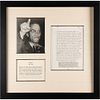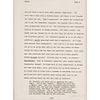Malcolm X Signed Page for Alex Haley’s 1963 Playboy Interview: "The Civil War's been over a hundred years, and there is not freedom for blac
Two ways to bid:
- Leave a max absentee bid and the platform will bid on your behalf up to your maximum bid during the live auction.
- Bid live during the auction and your bids will be submitted real-time to the auctioneer.
Bid Increments
| Price | Bid Increment |
|---|---|
| $0 | $5 |
| $50 | $10 |
| $200 | $25 |
| $500 | $50 |
About Auction
Apr 17, 2024
With nearly 900 lots up for auction, RR Auction's April Fine Autographs and Artifacts sale focuses on historic material from the 19th and 20th centuries. Among the highlights are a rare check signed by Abraham Lincoln; a significant Leon Trotsky publishing contract; important scientific letters by Albert Einstein and Charles Darwin; several remarkable naval manuscripts; and a historic letter by Martin Luther King, Jr. on the integration of higher education. RR Auction support@rrauction.com
- Lot Description
Page six from the original typescript of Alex Haley’s 1963 interview of Malcolm X for Playboy magazine, one onionskin page, 8 x 10.75, signed "Malcolm X" in the bottom margin (with a marginal line indicating his approval of the contents). In the interview, Malcolm X comments on segregation within American society and the lack of economic aid for black Americans. In part: "The Civil War's been over a hundred years, and there is not freedom for black men yet. That's practical? On record for integration you've got the President, Congress, the Supreme Court—show me your integration, where is it? The churches—the most segregated morning in America is Sunday morning. The labor unions? The NAACP just got thrown out of the back door for daring to question the lily-white policy. Mr. Muhammad teaches us to be for what's practical, really practical—and that's separation. It's also more natural than integration. Just like it's no more unnatural for us to be given some land of our own than plenty of other things the white man has done—for practical reasons. Five years ago, who could you have told that they'd give Latin America twenty billion dollars? Billions more to India, to Africa—neutralists! Even to Communist countries, your avowed enemies, Yugoslavia, Poland. Billions more to your competitors in Europe. You mean this great, fine, good white man in North America is so rotten that he gives king's ransoms to everybody else in the world and will still quibble about giving some land to the twenty million black men who have been so faithful?" Nicely cloth-matted and framed with a portrait and biographical caption to an overall size of 25.5 x 24.5. In fine condition.
Playboy's May 1963 interview with Malcolm X was one of the most famous of Haley’s career and gave most readers their first in-depth look at Malcolm X’s teachings and personality. Supporters and critics viewed the Muslim minister in very different terms. Admirers saw him as a courageous advocate for the rights of African-Americans and condemned crimes against black Americans; detractors accused him of preaching racism, black supremacy, and violence. Nevertheless, he has been described as one of the greatest and most influential African-American leaders in history. Within a year of granting this interview, with America still gripped by ever-growing racial tension, the once-combative black nationalist Malcolm X had repudiated almost every stance published. He had broken with the Nation of Islam movement, fallen out with its leader, Elijah Muhammad, renounced black supremacy, and embraced racial equality and human rights. He was assassinated in Harlem in 1965. - Shipping Info
-
Bidder is liable for shipping and handling and providing accurate information as to shipping or delivery locations and arranging for such. RR Auction is unable to combine purchases from other auctions or affiliates into one package for shipping purposes. Lots won will be shipped in a commercially reasonable time after payment in good funds for the merchandise and the shipping fees are received or credit extended, except when third-party shipment occurs. Bidder agrees that service and handling charges related to shipping items which are not pre-paid may be charged to a credit card on file with RR Auction. Successful international Bidders shall provide written shipping instructions, including specified Customs declarations, to RR Auction for any lots to be delivered outside of the United States. NOTE: Declaration value shall be the item’(s) hammer price and RR Auction shall use the correct harmonized code for the lot. Domestic Bidders on lots designated for third-party shipment must designate the common carrier, accept risk of loss, and prepay shipping costs.
-
- Buyer's Premium



 EUR
EUR CAD
CAD AUD
AUD GBP
GBP MXN
MXN HKD
HKD CNY
CNY MYR
MYR SEK
SEK SGD
SGD CHF
CHF THB
THB






